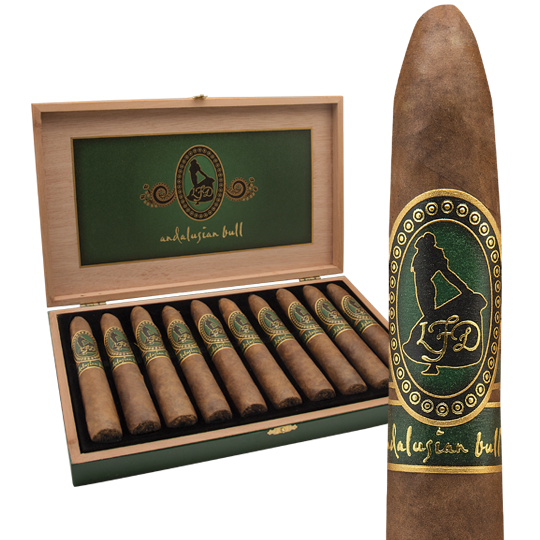How Long Do Cigars Last in a Humidor? 3 Factors Affecting Longevity
Cigars are not just a pastime; they’re a tradition, a craft, and a luxury that deserves proper care. For cigar enthusiasts, understanding the longevity of cigars within a humidor is vital to preserving their quality and flavor. But how long can cigars remain fresh in this controlled environment? The answer depends on several factors, including the humidor's quality, maintenance practices, and environmental conditions.
Why Proper Storage Matters for Cigars
What Is a Humidor and Its Purpose?

A humidor is a specially designed container or space that maintains the ideal environment for storing cigars. It works by regulating humidity and temperature, ensuring cigars stay moist enough to burn properly but not so moist that they develop mold or lose flavor.
These devices are essential for preserving cigars’ integrity over time. Without proper storage, cigars can dry out, crack, or lose their unique taste and aroma, turning a pleasurable experience into a disappointing one.
How Humidity and Temperature Affect Cigars
Cigars are sensitive to their environment, thriving in specific humidity and temperature ranges. The recommended relative humidity is 65–70%, while the ideal temperature lies between 65°F and 70°F. Deviating from these parameters can lead to various problems:
- High Humidity (>70%): Cigars may swell, develop mold, or become hard to light.
- Low Humidity (<65%): Cigars can dry out, causing cracks and flavor loss.
- High Temperature (>75°F): Promotes tobacco beetle infestations.
- Low Temperature (<60°F): Slows aging and affects flavor complexity.
How Long Can Cigars Last in a Humidor?
When stored under optimal conditions, cigars can last anywhere from several months to many years. For short-term storage (a few weeks to a few months), even basic humidors can maintain freshness. However, for long-term storage, a high-quality humidor with consistent maintenance is a must.
Premium hand-rolled cigars, in particular, can last decades or more and even improve with age, developing richer and more complex flavors over time. This process, known as aging, is akin to aging fine wine and is highly prized among cigar aficionados.
Factors That Affect Longevity of Cigars
While a humidor can preserve cigars for years, certain factors play a significant role in determining how long they remain fresh and enjoyable. These include the type of cigar, the quality of the humidor, and how well it’s maintained.
1. Type of Cigar
The type of cigar influences its longevity due to differences in construction and materials.
- Hand-Rolled Cigars: These are made from whole tobacco leaves and lack preservatives, allowing for superior aging potential and a longer lifespan in a humidor.
- Machine-Made Cigars: Often produced with short fillers and additives, these cigars typically have a shorter shelf life and are best consumed sooner.
2. Humidor Quality
The quality of the humidor directly affects its ability to maintain consistent humidity and temperature.
Wooden humidors, especially those made from Spanish cedar, are excellent for retaining moisture and enhancing cigar flavor.
A poorly sealed humidor allows air exchange, leading to fluctuating conditions and reduced cigar longevity.
3. Maintenance Practices
Even the best humidor will fail to protect cigars without proper upkeep. Regularly refill the humidifier with distilled water or a humidifier solution to maintain stable humidity. Additionally, monitor the hygrometer weekly to ensure that conditions remain optimal.
Signs That Your Cigars Have Gone Bad
Despite your best efforts, cigars can deteriorate over time. Watch for these telltale signs:
- Dryness
- Discoloration
- Mold
- Off Odors
- Tight or Loose Draw
Best Practices for Maximizing Cigar Lifespan
Proper storage and handling practices can significantly extend the life of your cigars.
1. Seasoning Your Humidor
Seasoning a humidor ensures it maintains consistent humidity. Follow these steps:
- Use a clean cloth dampened with distilled water to lightly wipe the interior walls.
- Place a shallow dish of distilled water or a humidification pack inside the humidor.
- Let the humidor sit for 24–48 hours, then check the humidity levels.
- Once stable at 65–70%, add your cigars.
2. Monitor Humidity and Temperature
Use reliable tools to track the conditions inside your humidor:
Digital Hygrometers
- Provide accurate and easy-to-read humidity levels.
Humidifier Packs
- Simplify maintenance by regulating humidity automatically.
3. Properly Place Cigar
How you arrange cigars in the humidor impacts their longevity and quality.
Ensure there’s enough space between cigars for proper airflow. Overcrowding can lead to uneven humidity distribution, affecting flavor and burn consistency.
Store cigars horizontally to prevent uneven pressure on their structure.
4. Rotate Cigars Occasionally
Rotating cigars within the humidor ensures even exposure to humidity, especially in larger humidors where conditions may vary slightly.
How to Rotate? Periodically move cigars from the top trays to the bottom and vice versa.
Why Rotate? This practice prevents certain cigars from drying out or becoming overly moist.
How often should I check my humidor?
For optimal cigar preservation, inspect your humidor every 1–2 weeks. During these checks:
- Use a hygrometer to confirm humidity remains within the 65–70% range.
- Refill the humidifier with distilled water or a humidification solution if needed.
- Look for signs of mold, beetles, or other damage.
Regular maintenance prevents small issues from becoming costly problems.
Can cigars last forever in a humidor?
While cigars stored under perfect conditions can last for decades and may even improve with age, they don’t last forever. Over time, the oils and flavors in the tobacco can degrade, resulting in a less enjoyable smoking experience.
What should I do if my humidor stops maintaining proper humidity?
If your humidor struggles to maintain proper humidity levels, take these steps:
- Inspect the humidor’s seal for gaps or imperfections. A faulty seal allows air to escape, disrupting humidity levels.
- If the humidifier has dried out, rehydrate the cigar with distilled water or a humidification solution.
- In cases of prolonged instability, re-season the humidor to restore its ability to retain moisture.
- Consider investing in higher-quality components like a digital hygrometer or advanced humidifier packs.
Conclusion
Proper cigar storage is both an art and a science. Using a high-quality humidor and maintaining optimal humidity and temperature conditions ensures your cigars remain fresh, flavorful, and enjoyable for years. Remember, regular checks and best practices like rotating cigars and seasoning your humidor can make all the difference.
Whether you’re an avid collector or a casual enthusiast, following these guidelines will help you maximize your cigars’ lifespan and enjoy them at their finest.
For premium cigars and expert storage tips, visit TRP Cigars.


